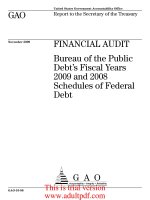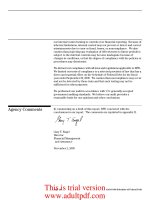United States Government Accountability Office GAO November 2004 Report to the Secretary of the Treasury _part1 pptx
Bạn đang xem bản rút gọn của tài liệu. Xem và tải ngay bản đầy đủ của tài liệu tại đây (68.96 KB, 2 trang )
a
GAO
United States Government Accountability Office
Report to the Secretary of the Treasury
November 2004
FINANCIAL AUDIT
IRS’s Fiscal Years 2004
and 2003 Financial
Statements
GAO-05-103
This is trial version
www.adultpdf.com
What GAO Found
United States Government Accountability Office
Why GAO Did This Study
Highlight s
Accountability Integrity Reliability
www.gao.gov/cgi-bin/getrpt?GAO-05-103.
To view the full product, including the scope
and methodology, click on the link above.
For more information, contact Steven J.
Sebastian at (202) 512-3406 or
Highlights of GAO-05-103, a report to the
Secretary of the Treasury
November 2004
FINANCIAL AUDIT
IRS's Fiscal Years 2004 and 2003
Financial Statements
In GAO’s opinion, IRS’s fiscal year 2004 financial statements were fairly
p
resented in all material respects. Because of continuing serious deficiencies
in financial systems and internal control weaknesses, however, IRS again
had to rely extensively on resource-intensive compensating processes to
prepare its financial statements. Due to these serious deficiencies and
internal control weaknesses, in GAO’s opinion, IRS did not maintain
effective internal controls over financial reporting (including safeguarding of
assets) or compliance with laws and regulations, and thus did not provide
reasonable assurance that losses, misstatements, and noncompliance with
laws material in relation to the financial statements would be prevented or
detected on a timely basis.
For the third consecutive year, IRS was able to meet an accelerated financial
reporting date, an accomplishment all the more notable because IRS was
simultaneously working to implement new financial management systems.
IRS also continued to make progress in its efforts to address its weakness in
controls over property and equipment and hard-copy taxpayer receipts and
data. However, GAO continues to consider issues related to IRS’s controls
over financial reporting, management of unpaid assessments, and collection
of revenue and issuance of tax refunds to be material weaknesses. GAO also
continues to consider issues related to information security to be a material
weakness. In addition, IRS was not always in compliance with laws
concerning the timely release of tax liens and the structure of installment
agreements it enters into with taxpayers. Recently enacted legislation
modifying the legal requirements regarding the structuring of installment
agreements will resolve this compliance issue for future audits.
The lack of a sound financial management system that can produce timely,
accurate, and useful information needed for day-to-day decisions continues
to present a serious challenge to IRS management. IRS’s present financial
management systems, which do not substantially comply with FFMIA,
inhibit IRS’s ability to address the financial management and operational
issues that affect its ability to fulfill its responsibilities as the nation’s tax
collector. IRS is installing a new financial management system intended to
resolve many of these problems and is presently implementing the first
phase of a major component of the system—the Integrated Financial System
(IFS). IRS’s effort to bring IFS online has experienced significant problems
and delays, however, and if IRS should encounter difficulties with the first
phase of IFS, the integrity of IRS’s financial records could be affected.
A
dditionally, the continued and serious weaknesses in information security
have significant implications for the reliability of financial management
information produced by the new financial management systems being
implemented.
Because of the significance of
Internal Revenue Service (IRS)
collections to federal receipts and,
in turn, to the consolidated
financial statements of the U.S.
government, which GAO is
required to audit, and Congress’s
interest in financial management at
IRS, GAO audits IRS’s financial
statements annually to determine
whether (1) the financial
statements IRS prepares are
reliable, (2) IRS management
maintained effective internal
controls, and (3) IRS complies with
selected provisions of significant
laws and regulations and its
financial systems comply with the
Federal Financial Management
Improvement Act of 1996 (FFMIA).
What GAO Recommends
In prior audits, GAO made
numerous recommendations to IRS
to address issues that continued to
persist during this year’s financial
audit. GAO will continue to
monitor IRS’s progress in
implementing the 76
recommendations that remain open
as of the date of this report. IRS
agreed with the report’s findings
and noted that it fairly presented
IRS’s progress and remaining
challenges. IRS cited a number of
planned improvements and
initiatives to address the matters
raised. Finally, IRS noted that the
agency had established a
continuing commitment to
improving financial management
that would be further enhanced by
implementation of its modernized
financial management systems.
This is trial version
www.adultpdf.com









